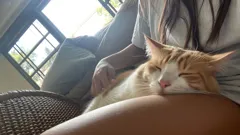
Imagine yourself relaxing in your sala when your cat jumps onto your lap and starts to purr. It's a soft, rhythmic sound that brings serenity to the air. What is it that makes this sound so special? In the Philippines, where many households consider their pusa as part of the family, knowing why cats purr is more than just curiosity. It's about deepening our connection with our furry companions. Let's explore the science and stories behind this wonderful feline behaviour.
Understanding the Cat's Purr: More Than Just a Sound
A cat's purr isn't just a sound—it's a complex vocalization produced by the cat's laryngeal muscles, creating pulses that range from 25 to 150 Hertz. Researchers found that these sounds are not just unique to felines, but can give benefits both to cats and humans. Imagine that when your cat purrs while spending quiet time with you, it's actually sharing a bit of its healing power.
Reasons Why Cats in the Philippines Purr
- Comfort and Contentment Most Pinoy cat owners know the purr as a sign of contentment, especially when their cats are cuddled or spending time with them. This calming sound shows your cat feels safe. Think of it as their way of saying, "It's nice to be home."
- Communication For kittens, purring starts as early as 2 days old, signalling security to their mother while nursing. Adult cats may use it to show trust to owners or to communicate with other pets.
- Physical Healing Some studies say that the frequency of cat purrs can help heal tissue and bones for themselves. Amazing, right? Our furry friends have their own health habits!
- Pain and Stress Relief Cats who are stressed or sick might purr to comfort and relax themselves. It can surprise many. If your cat purrs during a vet visit, it could be trying to calm itself.
Purring: A Bicol Cat's Secret Signal
Have you ever seen street cats wandering around places like Quezon City? Despite the busy environment, they still purr with happiness when given a gentle touch or a treat. It's a sign of trust between humans and our feline companions—a universal cat "language" anywhere in the country, whether your cat is a bred Maine Coon or a "kalye pusa" (street cat).
Some veterinarians in Manila note that purring can be a way to greet people and a sign that cats feel comfortable, especially in homes with busy families.
Can Cat Purring Benefit People, Too?
It's not just cats that benefit from purring. According to animal experts, cat purrs can help reduce stress and anxiety in their owners. The soothing presence of a purring cat has been connected to lower blood pressure—a big help in city life. No wonder many Filipinas enjoy "cat therapy" after a long day.
Unraveling Cat Purr Mysteries in Everyday Life
While it's easy to assume that purring is always good, the Philippines' diverse climate and busy urban lifestyle have shown us something important: context matters. If your cat's purr is paired with hiding or loss of appetite, it may not be pure happiness. Pay attention to their body language. As one family from Cebu shared, "When my cat purrs and follows me after work, I know it wants both affection and merienda (snack time)!"
Checklist: What Your Cat's Purr Might Mean
- Relaxed and stretched out: showing comfort
- Purring while eating: Feeling satisfied
- Purring when sick: Might need support
- Purring and hiding: Possible sign of stress
- Sudden changes in purring: Consult your vet
A purring cat can lift your mood and bring comfort, especially in the Philippines where cats add happiness and light to homes. When your pusa snuggles and purrs, remember that there’s more to it than meets the eye. Many people ask online, "Why do cats purr when you pet them?"—it's part of a wonderful, timeless friendship between pets and humans. Do you have a story about your cat’s purr? Share it in the comments and let the purring bring you more joy.
 Meg Magazine
Meg Magazine



Comments